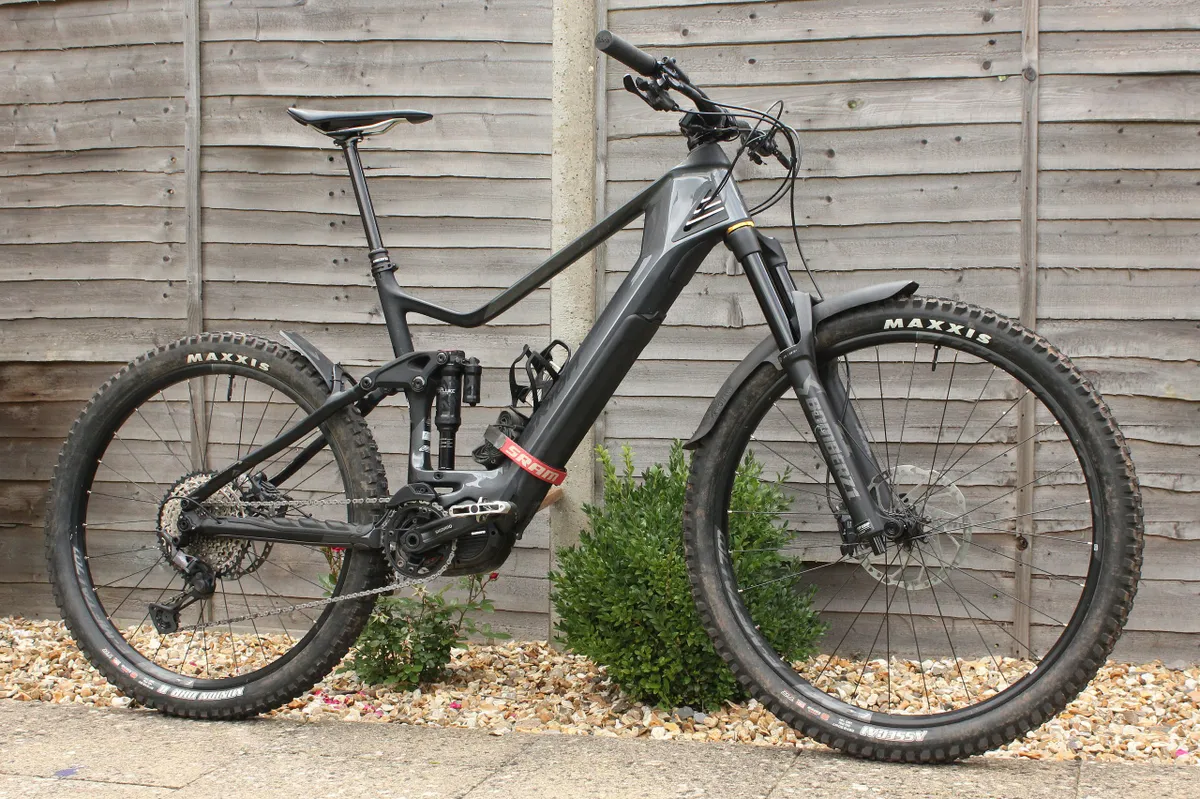In part six of our Backyard Bike Check series, MBUK’s editor James Costley-White (aka JCW) gives us a look at his Merida eOne-Sixty 8000 and explains why he picked an e-bike as his long-termer this year.
The bike
Merida eOne-Sixty 8000, 150mm travel, size XL, £5,850
It does feel weird not having a true ‘pedal bike’ for a long-termer this year. Thankfully, I do have access to test bikes if I feel the itch, plus my trusty Orange Clockwork hardtail is always on-hand for more visceral thrills. So why pick an e-bike? Curiosity, mainly. With their extra heft and long wheelbases, they're the antithesis of the light and lively trail bikes that I love. But we're seeing more and more of them out on the trails, so I felt it was time I spent some proper time on one and found out what it was like to live with for a whole year. As a time-challenged dad of two young kids, I also liked the idea of being able to ride more laps in less time. Plus, with some niggling health problems, the option of being able to put a bit less effort in on days when I was feeling bad but still get out for a ride was appealing.
I opted for the Merida eOne-Sixty 8000 on the grounds that it was available in an XL size with an OK reach, was based on the brand's proven One-Sixty enduro bike and was kitted out with some decent parts, while not being as exorbitantly expensive as some of the latest £10k+ e-bikes, even with a carbon fibre front triangle. It turned out to be a good choice. So, eight months in, am I an e-vangelist? You'll have to read my updates in the mag to find out! Here's the lowdown on my bike...
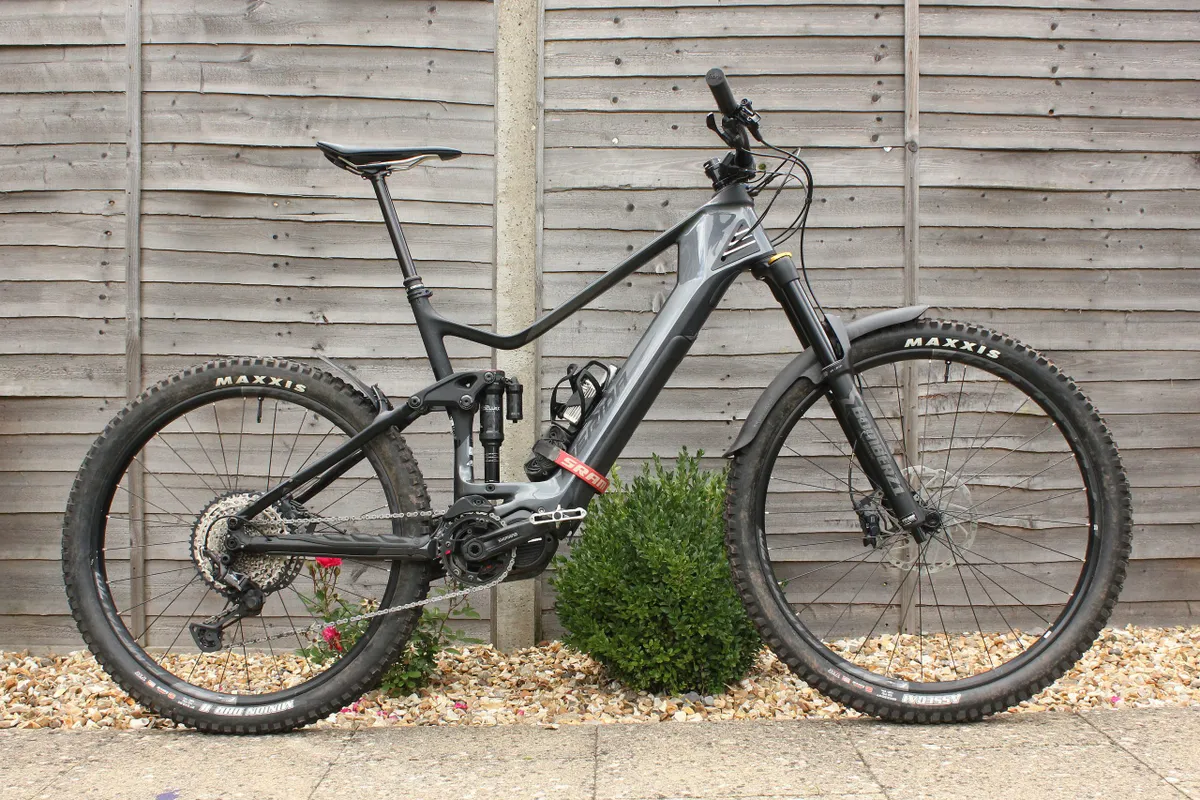
Motor & battery
The Merida uses a Shimano STEPS E8000 motor – a proven unit that's been around for a few years now. It delivers a decent amount of torque (70Nm) and assistance (up to 300 per cent what you put in, cutting out when you reach 15.5mph/25kmh), although doesn't quite match Bosch's latest Gen 4 motor (its main rival) for either. There's also a slight lag between starting pedalling and the assistance kicking in, which is easy to compensate for in most circumstances but, combined with the extra weight of an e-bike, can make it tricky to restart riding if you stall on a technical climb. On the plus side, the assistance is super-smooth, there's a useful difference in power between the Eco, Trail and Boost modes, and I've had no reliability or technical issues. There is a walk mode, but you need to be in one of the smaller cassette sprockets to make the most of it, which is unhelpful if you're suddenly confronted with an unridably steep ascent.
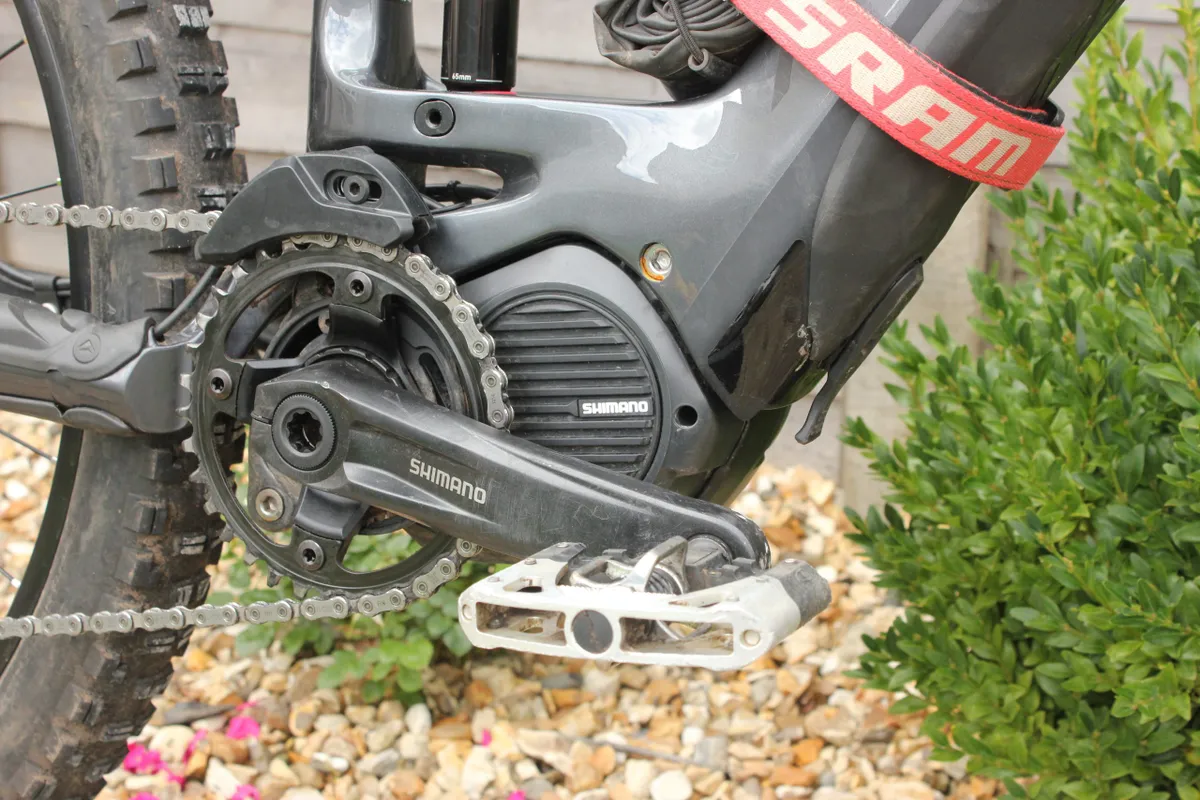
Because the E8035 battery is concealed inside the down tube, the 2020 eOne-Sixty looks a lot sleeker than the 2019 model, where the battery was only semi-integrated. It can be charged in-situ, via a socket at the base of the down tube, or removed, by detaching the rubberised armour section on the underside of the down tube (using an Allen key built into the quick-release lever for the rear through-axle). The battery has a reasonable 504Wh capacity, and for longer rides Merida can supply a spare, along with a custom backpack to carry it in. 'Gills' on the side of the head tube – Merida call this the 'Thermo Gate' – allow airflow to keep the battery cool, as well as providing an entry point for the internally-routed cables. The E8000 display clearly shows what mode you're in, how much assistance you're using and how much juice is left. It's easy to change modes using the two buttons next to the left handlebar grip.
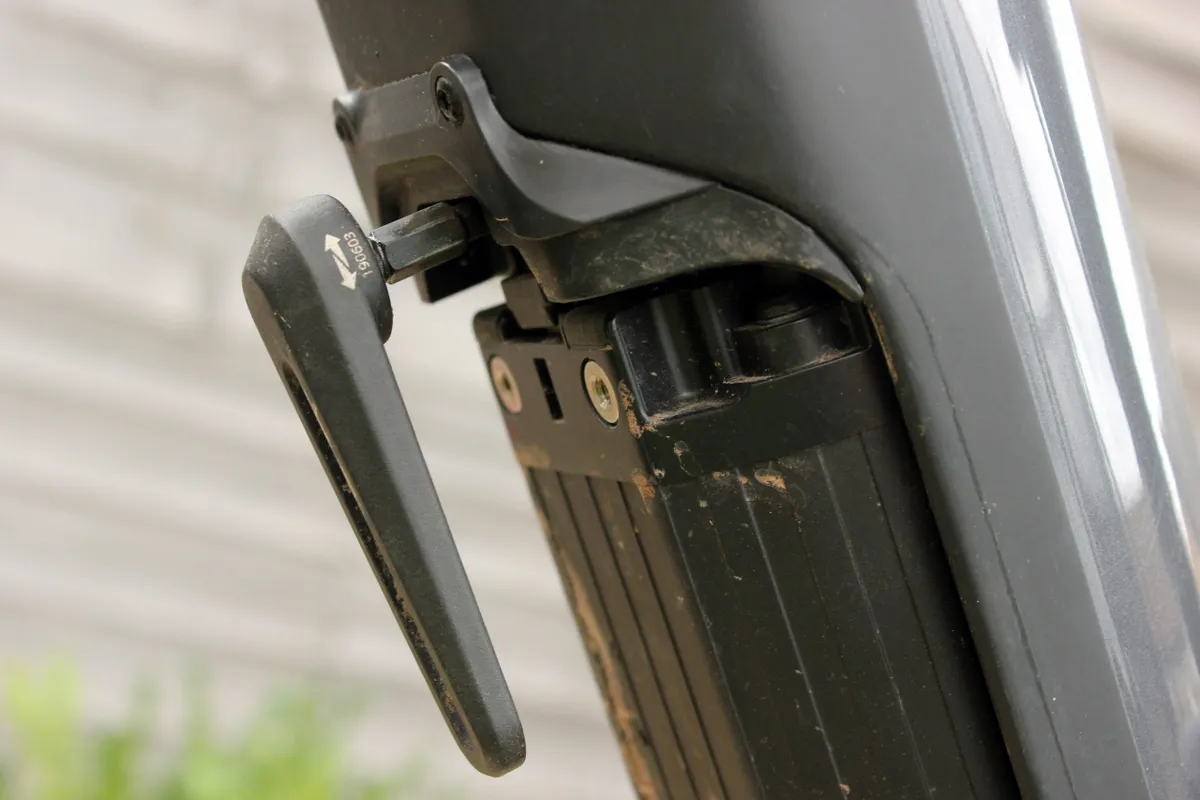
Suspension
Up front is a 160mm-travel (hence the e-OneSixty name), e-bike-optimised Marzocchi Z1 fork, which is essentially a cheaper Fox 36 with less sophisticated GRIP damper. It's stiff and swallows bumps well, and the extra weight over the 36 isn't noticed on a 24kg+ e-bike. Out back, the Merida uses a linkage-actuated single-pivot (aka faux-bar) design, with a pivot on the chainstay, to drive a RockShox SuperDeluxe Select+ shock. It's unusual to see this mix of Fox and RockShox kit, but the suspension balance is good, with both ends offering similar support and an equally plush feel.
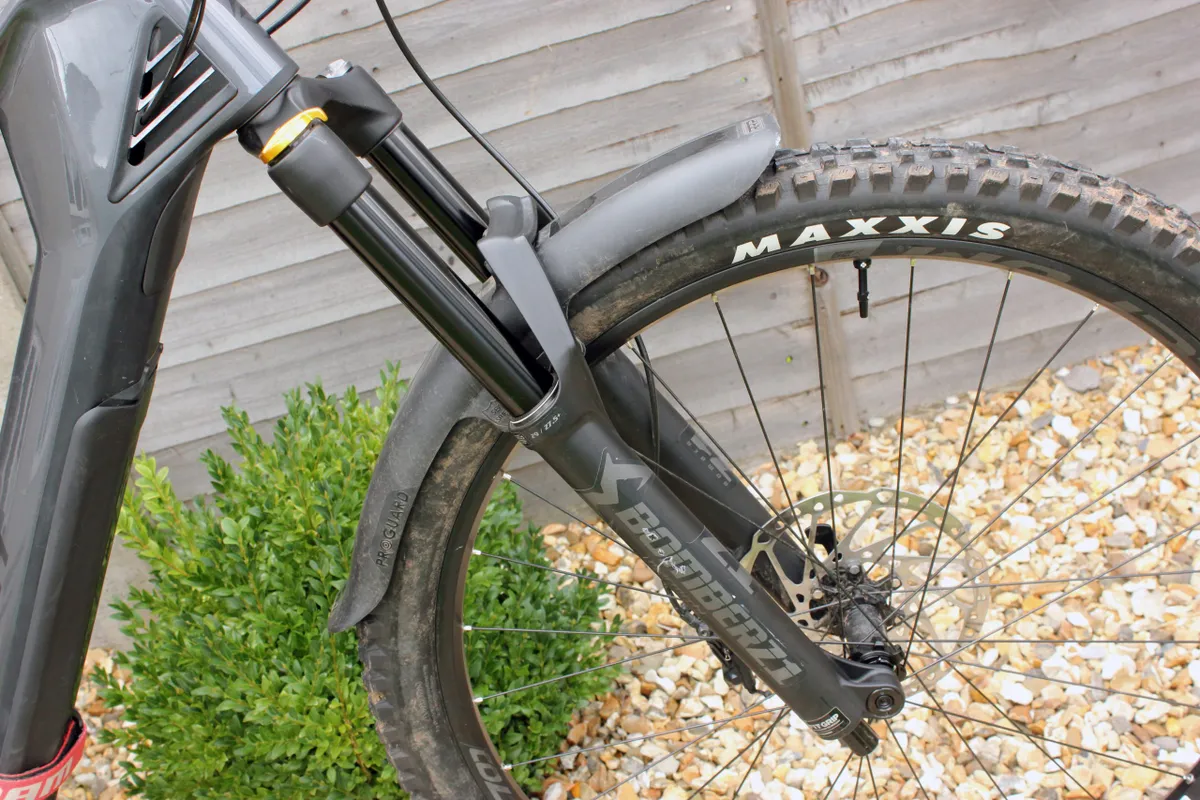
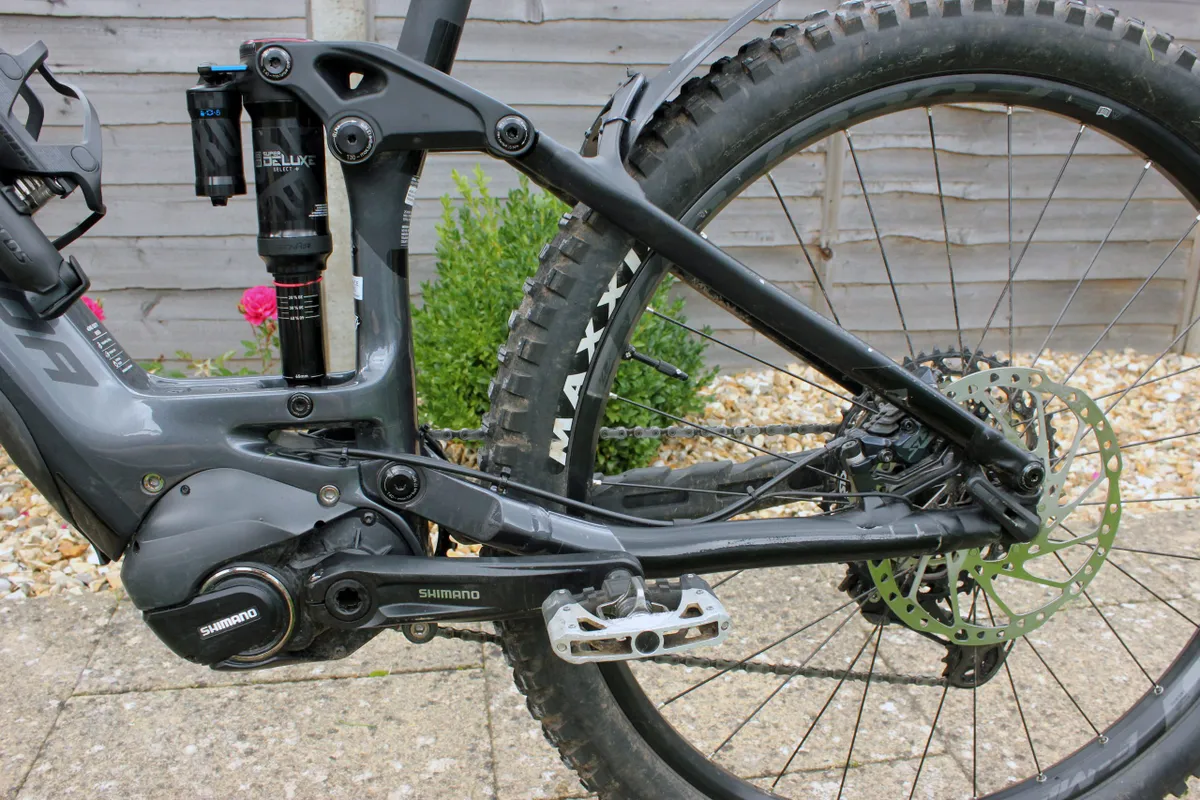
Wheels
The bike rolls on Fulcrum E-Metal 700 wheels, with Boost axles and a 30mm internal rim width. Merida have opted for a 'mullet' set-up, with a 29er wheel up front and a 650b out back. I guess this keeps the wheelbase a bit shorter on the smaller frame sizes and potentially gives a slightly more playful feel, but personally I'd prefer to have the same size at both ends, if only because it makes swapping wheels and tyres between bikes so much easier. Tyres are a 29x2.5in Maxxis Assegai and a 27.5x2.6in Maxxis Minion DHF II with EXO+ casings – a solid combo. One of the first things I did with this bike was set it up tubeless, which was a cinch. I run quite low pressures for maximum grip. With tyres this size I'll generally pump both ends up to around 20psi and adjust downwards from there, based on ride feel and trail conditions. I can get away with low pressures because I'm not the heaviest (11st/70kg) or most aggressive rider, and on an e-bike rolling resistance is less of an issue. If I'm planning a trip to the bike park or some rockier terrain, I'll add a couple more psi. Since these photos were taken, I've fitted some new Pirelli tyres for testing – a Scorpion E-MTB S up front and an R out back (£64.99 each, www.pirelli.com).
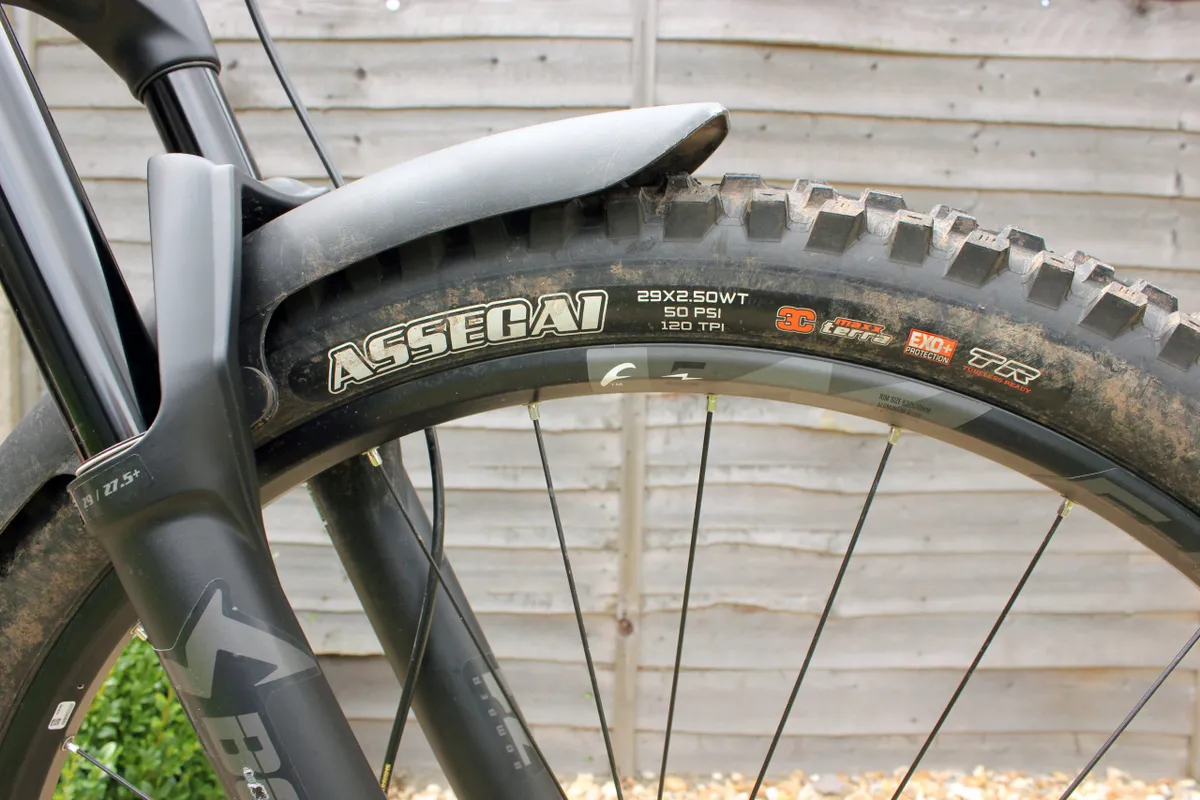
Drivetrain
Shimano's 12-speed Deore XT provides slick shifting and a wide gear range, with a 34t chainring (I'd normally go smaller, but here you have the added assistance of the motor) and 10-51t cassette. I'm keen to try out the new SRAM GX Eagle to see how it compares. and have the e-bike version, with single-click shifter and steel chainring. But I'm struggling to get hold of an XD driver for the rear wheel so haven't been able to fit it yet. I run Crankbrothers clipless pedals on all my bikes (even my commuter), because I like the way the extra float (compared to Shimano's SPD system) gives me a bit more freedom to shift my weight around. Occasionally I'll swap to a set of DMR Vault flats, but that's mainly for rides with my kids.
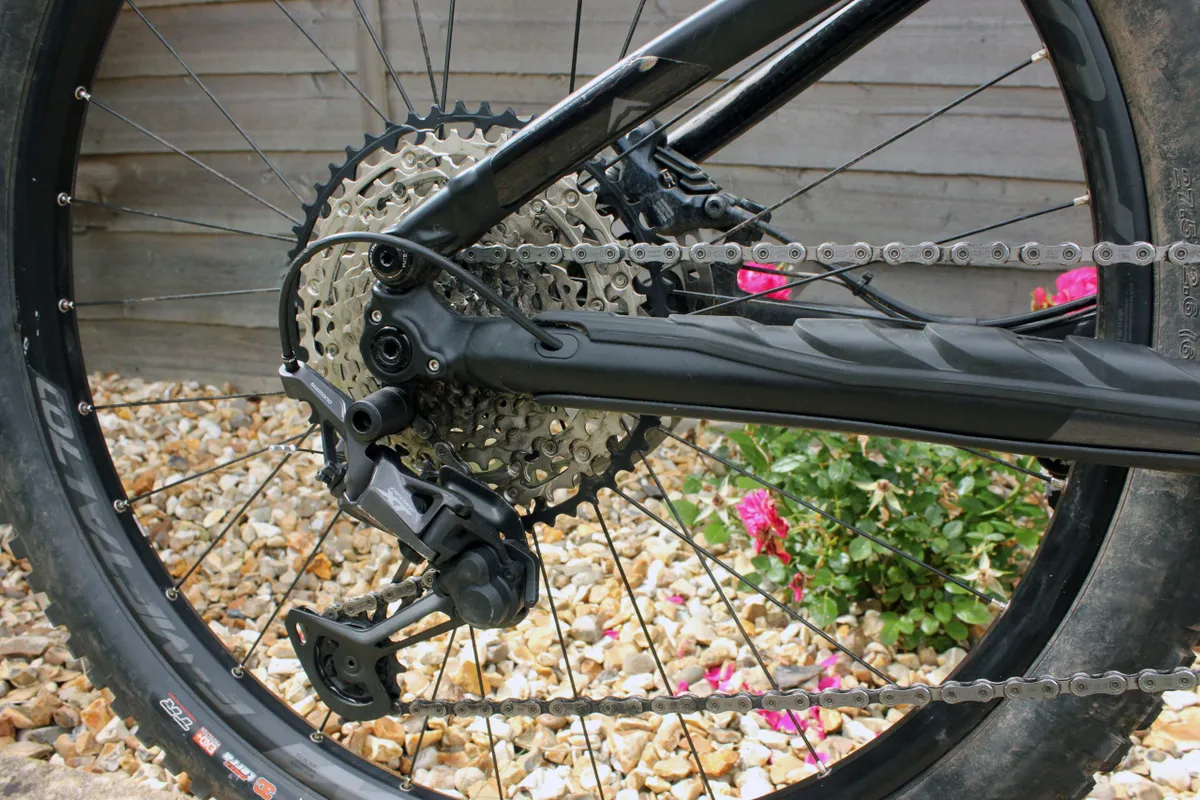
Cockpit
The cockpit was the one area I wasn't really happy with when I first sat on the Merida. Combined with the 480mm reach (10-20mm shorter than I'd ideally like), the own-brand 780mm bar with 10 degrees of backsweep left me feeling a little cramped. Fitted with firm Merida-branded grips, it also left me feeling a bit beaten-up after long descents. I sorted this by swapping it for an 800mm PRO Koryak Di2 riser bar (£54.99, www.freewheel.co.uk), which still allowed me to route the wire for the motor mode buttons internally (I could have fitted a regular bar and ziptied the wire to the outside, but my OCD tendencies never would have let me do that!), and some Fabric Magic grips (£16.99, https://fabric.cc). The front end still felt a little high, due to the long fork and tall head tube (665mm stack height on the XL), so I moved all the headset spacers to above the stem and slid the saddle forward to put more weight over the front wheel on climbs.
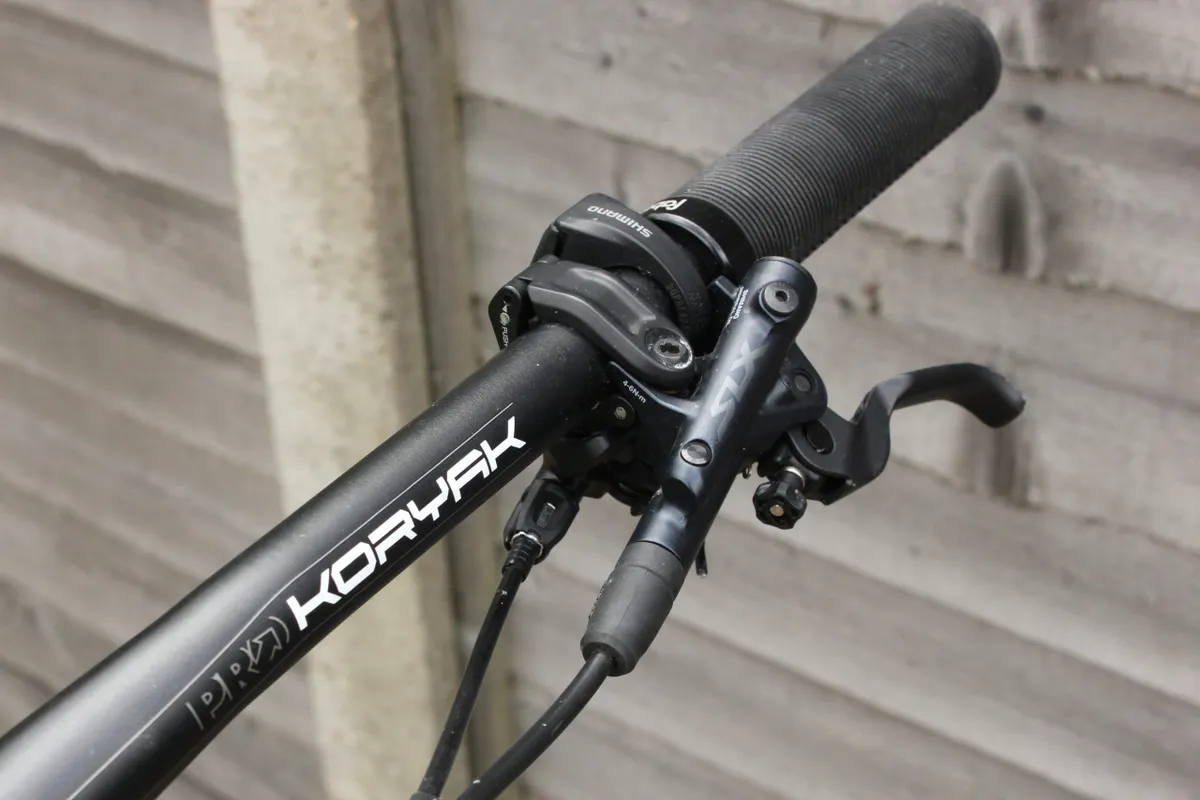
Brakes
Astonishingly good. That's how I'd describe the Merida's Shimano SLX four-pot stoppers, which are paired with 203mm rotors front and rear. Even with all the extra weight of the motor, battery, reinforced tyres and long-travel suspension, they stop on a dime, without the wandering bite-point issues that can plague Shimano's pricier brakes, and with decent modulation too.
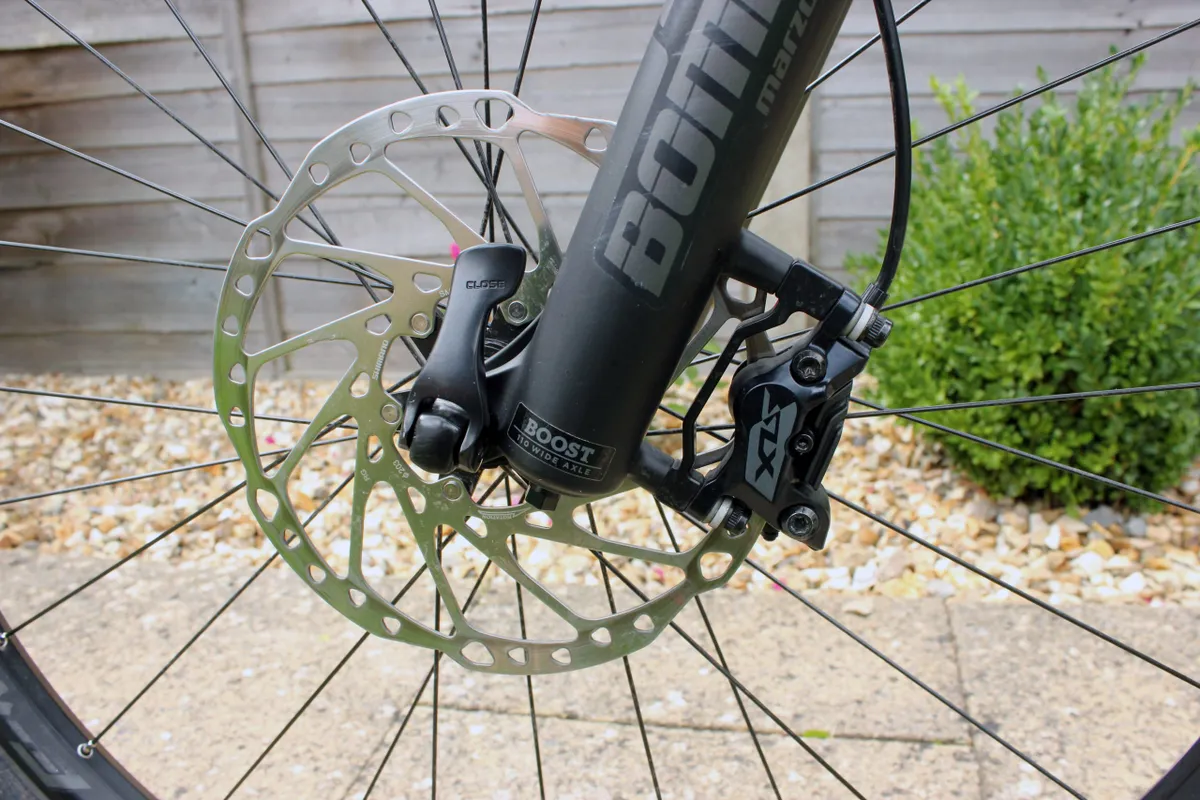
Seatpost, saddle & extras
The own-brand dropper post worked well enough and the 170mm version that came with the XL bike would be long enough for some, but I'm tall (6ft 2in/188cm) with a long inseam (34in/86cm) and wanted more wiggle room for the descents, so I replaced it with a 200mm Brand-X Ascend XL post (£169.99, www.hotlines-uk.com), which is working great so far – look out for a review in the mag soon. Merida's own Expert CC saddle is comfy enough, and has a little multi-tool hidden underneath. However, this is straight in the line of spray from the rear wheel and was beginning to get rusty, and also lacks a chain tool, so I removed it. Instead, I've fitted a Syncros Tailor iS 2.0 HV bottle cage with integrated tool and pump (£59.99, www.scott-sports.com).
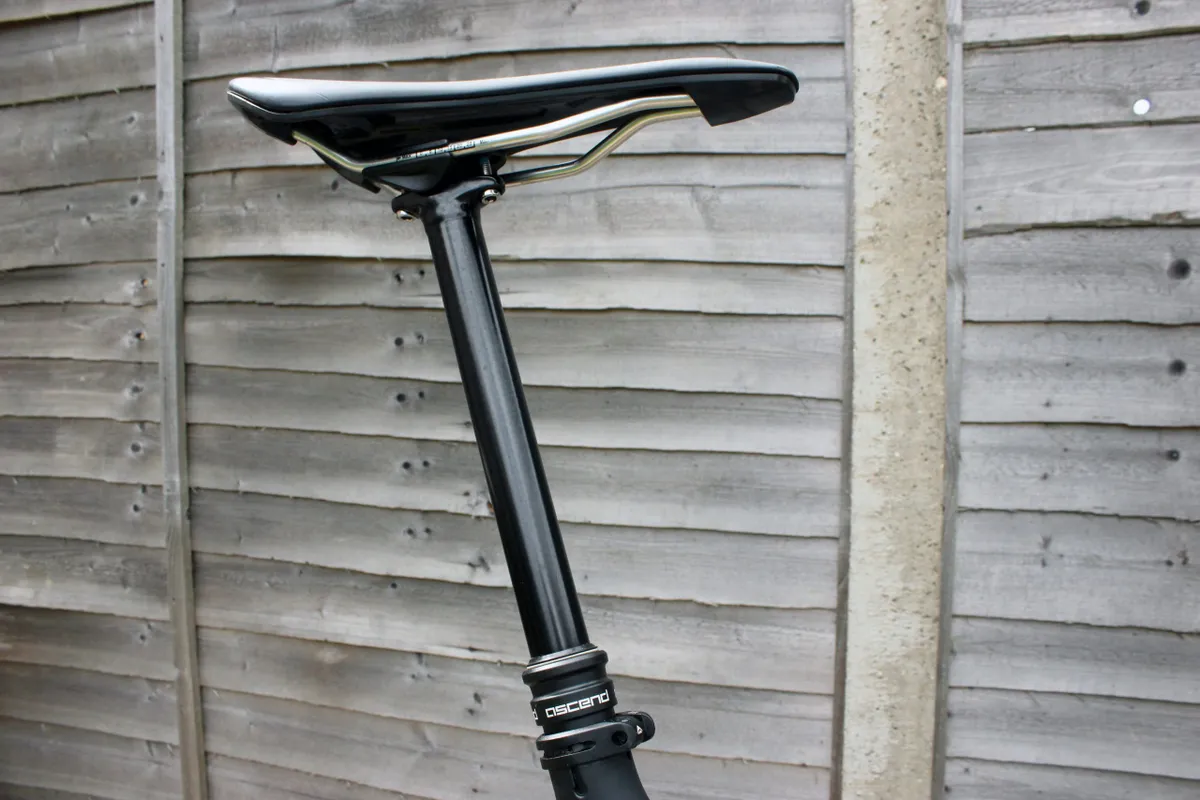
While it's a nice touch that the bike comes with mudguards, they're basic sheets of plastic attached with zipties. Wanting more coverage up front, I swapped the stock fender for an RRP ProGuard Bolt On Standard mudguard (£35.99, www.extrauk.co.uk), which attaches to the fork crown. It'd look overly bulky on a skinnier-tubed bike but doesn't look at all out of place here, giving the bike a purposeful, MX-style look. My first ride with it was a revelation – it works so well that I've stopped wearing riding glasses altogether. The rear mudguard isn't very effective, doing little to keep muck off your shorts, the dropper post seal or the rear shock, but I've left it in place for now. My final addition is a Backcountry Research Mutherload strap for a spare tube (£18.95, www.silverfish-uk.com). With this set-up I don't need to wear a pack for shorter rides, which is especially good on hot days.
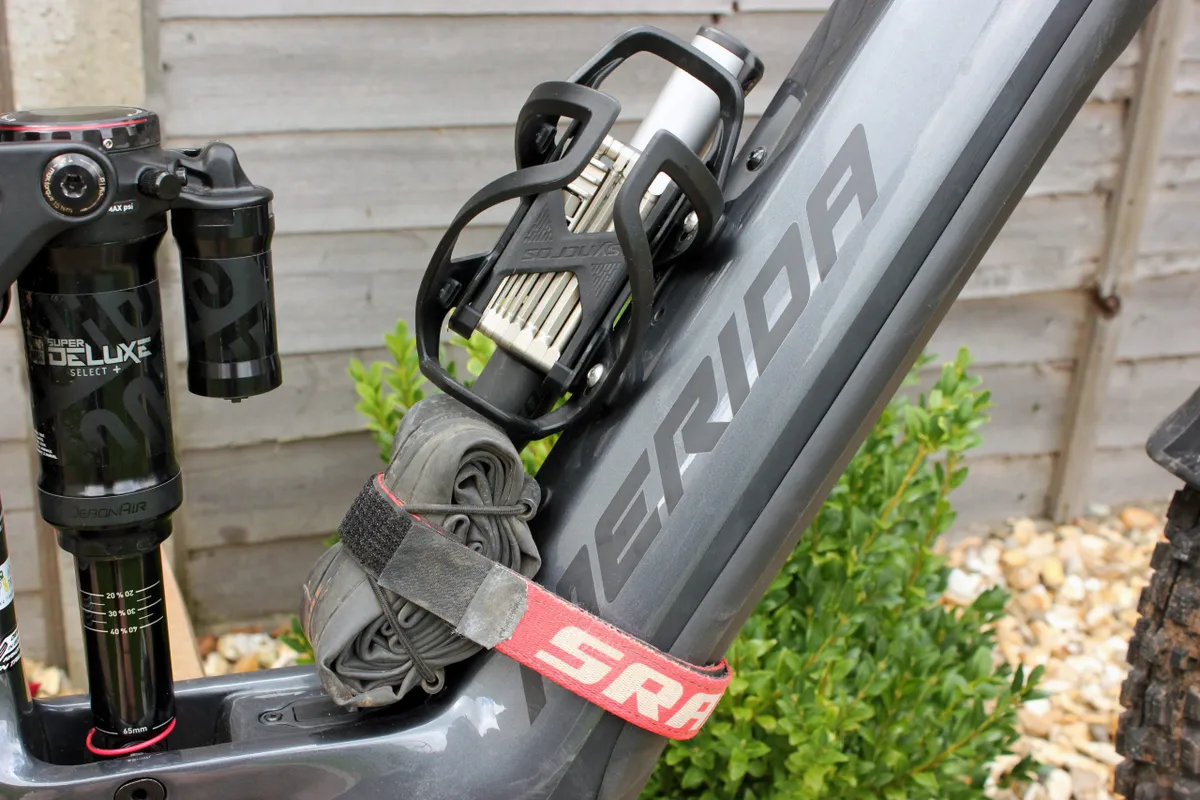
About MBUK's long-term bikes
Key magazine staff and testers get a bike (or in some cases, two) for the year, to ride in feature shoots and use as a test bed for new kit. These machines get a good thrashing, allowing us to report back to you on their long-term performance, any issues that arise and any upgrades that we deem necessary. You can stay updated via regular reports in the mag.
You can subscribe to MBUK here and check out our Facebook, Instagram and Twitter accounts for all of the latest mountain bike action.
And don’t forget to sign up to our newsletter!
